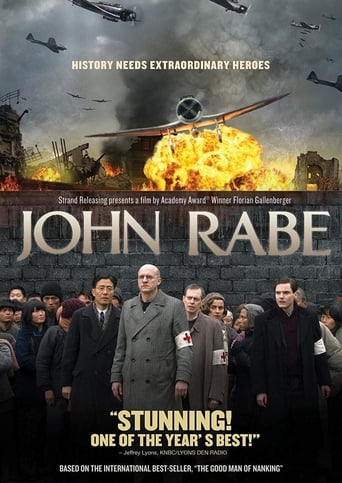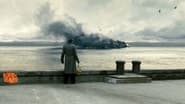MartinHafer
"John Rabe" is a very glossy and well done film about the actions of Rabe and a few other foreigners in saving as many of the residents of Nanking as they could during the Japanese invasion. The airplane attacks and look of the film were absolutely great--and the film is well worth seeing.I am very familiar with the story of John Rabe and used to teach my world history students about him and the Japanese destruction of Nanking (I have since retired). Much of what I'd learned were from the book "The Rape of Nanking" as well as several well made documentaries. So, I am NOT the typical person watching the story for the first time--I am a bit tougher to please. Because of this, I am much more critical that average and to me, the story was flawed because it actually seemed very sanitized. In other words, while the film DID show some of the Japanese atrocities, it didn't do much--probably because it would nauseate most viewers. BUT, by doing so, it minimized the evil that was perpetrated here--making the Japanese troops seem almost normal. It's rare, but I would have included much more blood and talked much more about the rapes and murder of children. Evil must not be minimized and here it just didn't seem as sadistic and wrong as the Rape of Nanking was.
makelvin
Prior to watching this file, I have read John Rabe's diary as well as Iris Chang's The Rape of Nanking. I have also watched many documentaries and movies made about the subject from China as well as from the US. I found this film to be one of better film on this subject than most of the other ones in existence today.The film is based primarily on the actual diary of John Rabe. Certain details were filled-in by the excellent and exhaustive work of Iris Chang's The Rape of Nanking. The importance of John Rabe's diary as opposed to the other accounts of what happened during the massacred is the fact that John Rabe was a German Nazi Party member that was working for Siemen in China. Germany was an allied of Japan at the time and there would have been no reason for John Rabe to have lied about atrocities committed by the Japanese if it did not actually happened. Also since John was mainly writing this as a personal diary for himself, there does not seem to be any reason for him to have exaggerated his description of the event. As a result, his diary is probably the credible historical account of the what actually happened in Nanking.I found some the Chinese version of the film on the subject seemed a little removed from the complex character interactions between most of these reluctant heroes of war. As a result, those movies does not seem quite as genuine and touching as this film.Most the events from this film seems very accurate or at least true to the overall sense of John Rabe's diary. Obviously some of the atrocities had to be consolidated to be able to fit those events into a slightly over two hour film. But one of the most puzzling inaccuracy of the film was the fictional character Valérie Dupres at the International Girls College. Why was it necessary for the film to use a fictional character's name instead of the actual courageous heroine Minnie Vaultrin from the Ginling Girls College. She had done so much during the massacred that it seems unfair to not use her real name in the film. This is my primary reason for not giving this film a perfect 10. If anyone can provide an explanation as to why Minnie Vaultrin name was not used in this film, I really would appreciate it.
Esmee Webb
John Rabe's story is important and probably merited its 'blockbuster' treatment. Rabe was the elected head of the international organisation that attempted to save the Nanjing Chinese from the appalling treatment they received at hands of their Japaense conquerors in 1937-8. The scale of the massacre, some 200,000-300,000 Chinese were killed, is still denied by many Japanese. These poor people were buried alive, beheaded in competitions, mown down by machine gun, burnt alive. The women were gang raped and, if they did not die as a result, sexually mutilated to ensure their deaths. The appalling behaviour of the Japanese troops in Nanjing is not sufficiently well known. By making a Hollywood-style 'blockbuster', the Germans have done the world a service. The film may be, indeed is, wrong in detail, but at least it may be seen by a wide audience who may then be tempted to find out more. In my opinion, this is a MUST SEE film because it addresses an appalling event that has been covered up for far too long.
imdb-557-352846
Before watching this movie, I went to Rabe's house in Nanjing and I read his diary. I was surprised that the movie does not match with the diary. Important parts are missing, and there are even contradictions at some points. For example: according to the diary, Rabe's wife Dora is outside Nanjing before the Japanese invasion starts. In the movie, Dora is still in Nanjing. And when it comes to the date that Rabe leaves Nanjing, there's also a couple of months difference between the diary and the movie. It seems as if the movie producers wanted to 'dramatize' the original story. I don't understand why. Rabe's diary is dramatic enough. My advice is to skip the movie, and read the diary instead.




